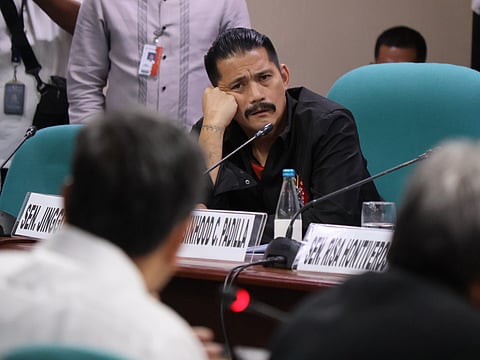
- NEWS
- the EDIT
- COMMENTARY
- BUSINESS
- LIFE
- SHOW
- ACTION
- GLOBAL GOALS
- SNAPS
- DYARYO TIRADA
- MORE

Senator Robin Padilla is rallying for clearer regulations on Halal certification as he mentioned having two different agencies involved in the certification and accreditation.
In a recent hearing of the Committee on Cultural Communities and Muslim Affairs, Padilla sought clarification of the role of agencies involved in the certification of Halal food products and the detection and seizure of fake Halal products.
Padilla noted that both the Department of Trade and Industry and the National Commission on Muslim Filipinos are currently involved in certification and accreditation.
He emphasized the significance of the Halal industry involving more than $2.22 trillion or P121.28 trillion, based on the International Market Analysis Research and Consulting Group in 2022. This is expected to grow to P228.1 trillion in 2028.
"Hiwalayin natin, isang nagse-certify at isa naghuhuli (Let us separate this so one agency will certify and another will enforce)," said Padilla.
"Kailangan nating proteksyunan ang Muslim brothers and sisters. Bilang kami mambabatas din, tingnan din natin ang kapakanan naman ng ating nagnenegosyo (We must protect our Muslim brothers and sisters. As lawmakers, we must also consider the interests of traders)," he added.
Padilla also called intensified awareness drive on the dietary principles of Muslims in the Philippine National Police and other government agencies regarding the dietary principles of Muslims.
Citing the previous shooting incident in Taguig City over serving pork meal to a Muslim police officer, Padilla underscored that an intensified campaign on the matter will prevent a repeat of the untoward event stemming from the violation of Muslims' beliefs.
"Nais ko pong linawin: hindi po ito paghiling ng espesyal na pagtrato. Atin lamang pong inaasahan na sa usaping ito, ay magkaroon tayo ng tapat na pakikitungo sa ating kapwa, at ganap na transparency sa publiko nang walang anumang anyo ng panlilinlang (I want to make it clear that we Muslims are not seeking special treatment. All we want is to address these issues with utmost transparency)," said Padilla.
On the other hand, the committee also tackled during the hearing Senate Bill 2406 which sets 1 March as a day of recognition for traditional and religious attire.
Padilla said our history is not only recorded in books and documents but in attire such as "Barong Tagalog," "Balintawak," and "Baro't Saya"; Ilonggo jusi and pina, Moro malong, Bicol sinamay, nipis, and patadyong; Ilocano abel, Visayan tapis pintados, Bagobo dagmay, Bilaan tandayon, Mandaya ikat, and many more.
"Sa madaling sabi, kung nais po nating bigyang diin ang pag-iingat sa ating pambansang pagkakakilanlan at sa bukod-tanging kultura at tradisyon ng 110 grupo ng Indigenous Peoples o IPs na binubuo ng 14 hanggang 17 milyong Pilipino, mahalagang hakbang po ang pagtatalaga ng isang araw ng pagkilala sa ating kasuotang tradisyunal at panrelihiyon (If we want to give importance to our national identity and the culture and tradition of 110 Indigenous Peoples groups that comprise up to 17 million Filipinos, setting aside a day of recognition for traditional and religious attire would go a long way)," he said.
